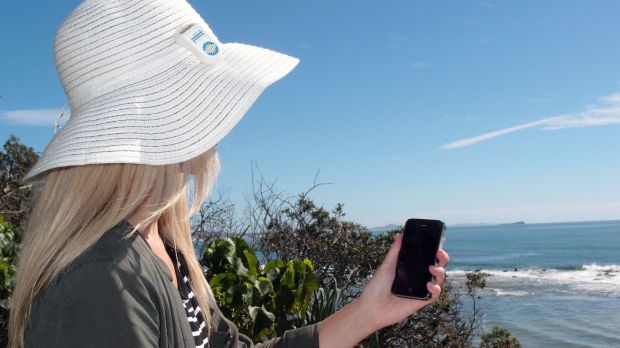
Queensland University of Technology researchers are looking at new ways to prevent sunburn. Pictured is research assistant Linda Finch. Photo: QUT
Those most at risk of developing deadly skin cancers are also the people least likely to pay attention to the warnings.
It’s a troubling trend and one that Queensland researchers are hoping to turn around with new research into what they hope could be the 21st century’s answer to “slip, slop, slap”.
Nationwide, there are more than 12,000 new cases of melanoma, the most deadly skin cancer, every year, resulting in more than 1500 deaths, according to the Australian Association of Cancer Registries.
Queensland is known as the “skin cancer capital of the world” and more than 72 per cent of Queenslanders aged 18-24 are sunburnt each year.
“The rest of the population we’ve seen wonderful improvements due to the fantastic public health prevention campaigns such as SunSmart – it started with Sid (the seagull and slip, slop,slap),” she said.
“It’s fantastic to see shade-built environments in most development and architecture-type involvements so it’s really got the whole of society looking at how we can better help prevent skin cancer.
“However, for whatever reason this younger population… Really don’t conform to improving in their sunburn. They still get the highest rates of sunburn and it’s really trying to untangle why.”
If the research pans out the way she hopes Dr Hacker can see the possibility of UV sensors in fitness bands and smartwatches within three years.
But the first step is to test whether what’s available now can actually work to help keep young people out of the sun.
“It’s definitely a chance for us to get a step ahead on the war on skin cancer because of these new technologies. They have the potential to enable people to avoid, prevent and protect themselves from a sunburn,” Dr Hacker said.
The QUT postdoctoral research fellow is looking for Queenslanders aged between 18 and 30 to take part in a trial of either a Western Australia-developed wearable UV meter or Cancer Council Victoria SunSmart app.
“Hopefully that will allow people then to modify their behaviour and prevent themselves from being sunburnt,” she said.
“We want to see how well that device works in these young people as well as compare a mobile phone app”
Volunteers must be 18-30 years old, own a smartphone and never have had melanoma or used the SunSmart app before. They will be offered a “small reimbursement” for their time.
Email skntec@qut.edu.au for more information.
